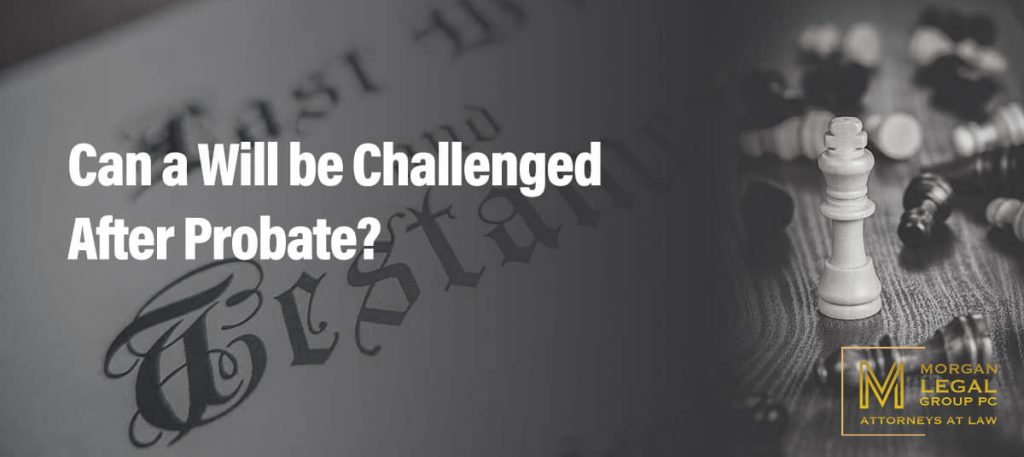
Once the probate process is complete and the court has approved the will, it is typically considered final and unchangeable. Probate involves the legal management of a deceased person’s estate, including validating the will, settling debts, and distributing assets according to the will’s instructions.
While the general rule is that a will is final after probate, there are specific circumstances where changes can be made:
- Creating a Codicil: A codicil is a legal document used to make minor adjustments to a will. It must follow the same formalities as a will and be executed with the same level of formality.
- Revoking and Replacing the Will: If significant changes are needed after probate, the individual can revoke the existing will and create a new one reflecting their updated intentions. The new will must meet legal requirements for validity.
- Challenging the Will: Interested parties can contest the validity of a will in court, citing factors like undue influence or fraud. If the court invalidates the will, it may be set aside, leading to a revision in asset distribution.
It’s important to note that laws and procedures regarding will modifications vary by jurisdiction. If considering changes to a will after probate, seeking advice from an estate planning or probate attorney is recommended to understand the available options in your specific situation.
Exploring the Concept of a Will
A will, also known as a last will and testament, is a legal document outlining an individual’s wishes regarding the distribution of assets and management of affairs after their death. It allows the testator or testatrix to specify how their property, including finances, real estate, personal items, and investments, should be distributed among chosen beneficiaries.
Key elements typically found in a will include:
- Executor Appointment: Naming a person or entity responsible for carrying out the will’s instructions, such as estate administration and asset distribution.
- Beneficiaries: Identifying individuals, organizations, or charities receiving specific assets or shares of the estate.
- Guardianship: Appointing a guardian for minor children in the event of the testator’s death.
- Specific Bequests: Allocating particular items or sums to specific recipients.
- Residual Distribution: Detailing the distribution of remaining assets after debts and specific bequests are settled.
A will must typically meet specific requirements to be legally valid, which can vary by location. These requirements often include the testator’s mental capacity, legal age, written format of the document, and witness signatures.
Consulting with an estate planning or wills attorney is crucial to ensure the proper drafting and execution of your will in compliance with local laws. They can provide personalized advice based on your circumstances and ensure your wishes are accurately reflected in the document.
Acceptance and Distribution of a Will
Generally, a will does not require formal acceptance. Once a person creates a will and passes away, it becomes effective and is executed according to its terms. The appointed executor or personal representative takes on the responsibility of carrying out the will’s instructions, including estate administration, debt settlement, and asset distribution.
Beneficiaries named in the will are entitled to their inheritances without needing to formally accept them. Upon the testator’s death, the assets specified in the will become part of the estate, and the executor is responsible for distributing them as outlined. Beneficiaries receive their designated shares, with acceptance assumed unless they choose to disclaim their inheritance.
If a beneficiary wishes to disclaim their inheritance, they typically must do so within a specific timeframe and in accordance with relevant laws and procedures.
Seeking advice from an estate planning or probate attorney is recommended to understand the legal requirements and processes related to wills and inheritances in your area.
Understanding the Concept of an Estate
An estate encompasses an individual’s total net worth, including assets, properties, possessions, and liabilities at the time of their death. It consists of everything owned or legally held by the individual. Here are key points to grasp about estates:
- Assets: Real estate, personal property, financial accounts, businesses, and intellectual property are among the assets included in an estate.
- Liabilities: Debts and obligations, such as mortgages, loans, and taxes, are part of the estate and are typically settled using estate assets during probate.
- Estate Planning: The process of organizing one’s estate to ensure assets are distributed according to their wishes and to minimize tax implications.
Consulting with professionals in estate planning can assist individuals in navigating the complexities of estate management and ensuring their assets are handled in line with their intentions.
>Beneficiary relationships: Are there beneficiaries or individuals who stand to benefit from the will who had a close relationship with the testator and may have exerted undue influence?
If a will is found to have been made under duress or undue influence, it may be deemed invalid, and a prior will or intestacy laws may govern the distribution of the estate. Contesting a will based on duress can be a complex legal process, and it is advisable to seek legal advice from a knowledgeable attorney.
Seeking Legal Advice from an Estate Planning Attorney
Engaging with a legal professional specializing in estate planning and probate law can offer valuable insights and support when considering changes to a will post-probate. These experts can provide guidance on the legal processes involved and help individuals navigate the complexities of estate administration.
Factors to Consider When Challenging a Will’s Validity
When questioning the validity of a will, it is essential to evaluate various factors to determine if the document accurately reflects the testator’s intentions. One critical aspect to examine is whether the contents of the will align with the testator’s known wishes, previous statements, or relationships with beneficiaries. Any significant deviations from these factors may raise concerns about the will’s validity.
Additionally, violations of legal standards during the will’s creation, such as fraud, forgery, or coercion, can impact its validity. In such cases, presenting evidence to substantiate the claims is crucial, and seeking advice from a legal professional specializing in estate planning or probate law is recommended.
Steps Involved in Challenging a Will Post-Probate
Challenging a will after probate requires a structured legal process that involves several steps. These steps include evaluating the grounds for challenge, engaging legal counsel, collecting supporting evidence, initiating a legal challenge, notifying involved parties, participating in court proceedings, and considering settlement or trial options. It is important to recognize that the procedures for challenging a will post-probate can vary significantly, and seeking guidance from a legal professional familiar with the jurisdiction is advisable.
Can a Will be Changed After Probate?
While a will becomes a legally binding document after going through probate, there are circumstances where changes may be necessary. Errors in the will, changes in circumstances, or legal challenges can prompt the need for modifications post-probate. To change a will after probate, individuals must consult with an attorney, file a petition with the probate court, notify all interested parties, obtain court approval, and execute the new will in compliance with state laws.
Benefits and Practical Tips for Changing a Will After Probate
Changing a will after probate can be a complex process, but it may be necessary to ensure the deceased’s wishes are carried out effectively. Some benefits of making changes include addressing errors, adapting to changed circumstances, and resolving legal challenges. Practical tips for navigating this process include seeking legal advice, filing a petition with the probate court, notifying interested parties, obtaining court approval, and executing the new will according to state laws.
Respecting the Final Wishes of the Deceased
One crucial aspect of estate planning is ensuring that the final wishes of the deceased are honored. This involves making any necessary changes to the will to reflect the current circumstances and ensure that the beneficiaries are accurately listed.
Consulting with a Knowledgeable Lawyer
When considering changing a will after probate, it is highly recommended to consult with a skilled attorney who specializes in estate planning. An experienced lawyer can provide valuable guidance on the legal requirements and procedures involved in making amendments to a will after probate.
Rectifying Mistakes or Omissions in the Will
In cases where errors or omissions are discovered in the will after probate, it may be necessary to file a petition with the probate court to make the necessary corrections. This process ensures that the final document accurately reflects the deceased’s intentions.
Updating Beneficiaries and Heirs
Another common reason for changing a will after probate is to update beneficiaries and heirs. This may involve obtaining court approval to make the changes legally binding and ensure that the assets are distributed according to the deceased’s wishes.
Illustrative Examples
Here are a few real-life scenarios where wills were successfully modified after probate to address errors, changes in circumstances, or legal disputes:
- Scenario 1: A will was amended after probate to correct errors and update beneficiaries.
- Scenario 2: Changes were made to a will post-probate to accommodate significant changes in the deceased’s and beneficiaries’ circumstances.
Personal Insight
For individuals contemplating changing a will after probate, it is crucial to seek advice from a competent attorney who can guide them through the process. Modifying a will after probate is a complex undertaking that requires careful consideration and legal expertise to ensure a successful outcome.




